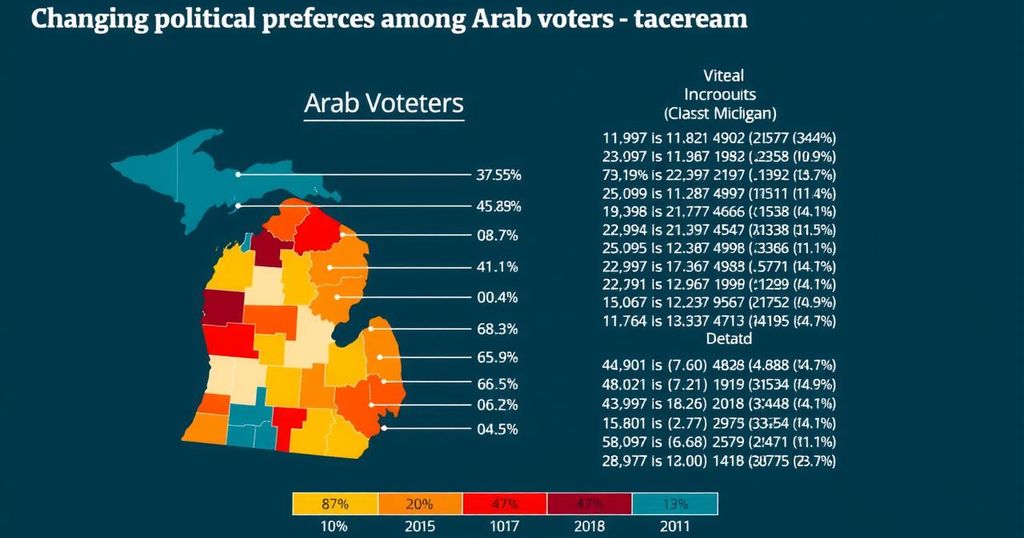The Shift of Arab American Voters in Michigan Towards Trump Amidst Regional Turmoil
Growing discontent among Arab Americans in Michigan is leading a notable shift toward support for Donald Trump ahead of the U.S. elections. This transition stems from frustration with the Biden administration’s pro-Israel stance amid conflicts in Gaza and Lebanon, prompting community activists to hold Democrats accountable for neglecting Arab interests. Local leaders are increasingly aligning with Trump as they search for alternative representation, signaling a potential change in voting patterns that could impact the outcome of the election in swing states like Michigan.
Amid the backdrop of escalating tensions in Gaza and Lebanon, a noteworthy transformation is occurring within the political landscape of Arab Americans in Michigan, particularly in Dearborn. A growing number of Arab American voters have begun to align themselves with Republican presidential candidate Donald Trump, challenging the historically Democratic leanings of this community. Activists such as Samraa Luqman express discontent with the Democratic Party’s neglect of the Arab vote, boldly stating that Arab Americans should be held accountable for the possible defeat of Vice President Kamala Harris. “For too long, Democrats have taken the Arab vote for granted, and it is time for them to pay the price for the United States-backed Israeli war on Gaza and Lebanon,” Luqman asserted. This sentiment is echoed by a broader frustration aimed at President Joe Biden’s unwavering support for Israel during its military actions in the region. Traditionally marginalized by Trump’s earlier hostile rhetoric towards Muslims and immigrants, Arab Americans now seek a voice in an electoral bloc that was once thought improbable. The former president’s recent outreach efforts, which included a visit to Dearborn and engagement with local Arab American leaders, have prompted individuals like Luqman to consider his platform. “Voting for Trump is a gamble but supporting Harris is a guaranteed loss when it comes to Israel-Palestine,” she expressed. Members of the community are vocal about their disappointment with the current administration’s policies. Some, including business leaders like Albert Abbas, have spoken out against what they perceive as a betrayal by the Democratic leadership. Meanwhile, those attending Trump’s rally voiced optimism about his ability to effect change in the Middle East, despite acknowledging his contentious history. “If he said he’s going to stop the war, he’s going to stop the war,” stated local resident Hassan Hussein Abdullah. In contrast, opposition voices caution against embracing Trump, highlighting the potential negative ramifications of his policies and rhetoric. Sami Khaldi, head of the Dearborn Democratic Club, noted Trump’s previous actions that caused distress for Arab Americans. “He’s the one who moved the US embassy to Jerusalem…We know what he stands for,” Khaldi commented. The sentiment of disillusionment has extended beyond Dearborn, as some municipal leaders, such as Hamtramck’s Mayor Amer Ghalib, have begun to forge ties with Republican representatives, largely in response to the current political environment and community concerns about social issues like LGBTQ rights. This shift indicates a deeper ideological alignment that may redefine voting patterns among Arab Americans, particularly in swing states like Michigan. As the election approaches, the context of community dissatisfaction and the search for alternative representation suggest that Arab Americans may play a pivotal role in determining the outcome. The collective sentiment that political allegiance must be reflective of accountability challenges both major parties to reconsider their approach toward the Arab American electorate.
In recent months, Arab Americans in Michigan have found themselves at a political crossroads, particularly due to the ongoing conflict in Gaza and its implications for U.S. foreign policy. Historically a Democratic bastion, the community expresses significant frustration over the Democratic leadership’s steadfast support for Israel despite the humanitarian crisis unfolding in the region. With the 2024 presidential election approaching, many are reconsidering their allegiance, leading to an influx of support for Donald Trump, a candidate who, despite his previous anti-Muslim rhetoric, seems to be capitalizing on this discontent. The dynamics within this community are further complicated by local leaders aligning with Republican ideologies, indicating a potential shift in voting behaviors moving forward.
As the electoral landscape shifts, Arab American voters in Michigan find themselves increasingly disillusioned with the Democratic Party, especially regarding foreign policy in the context of the Israel-Palestine conflict. This dismay has initiated a significant political realignment, with many community members considering Donald Trump as a viable alternative despite his controversial history. The outcome of this electoral reorientation could potentially redefine political strategies and alliances, prompting both Democrats and Republicans to make concerted efforts to engage with this vital voter bloc in future elections.
Original Source: www.aljazeera.com




Post Comment